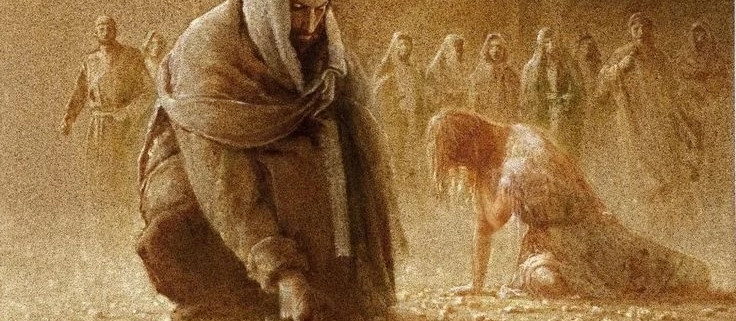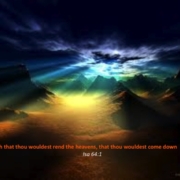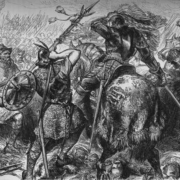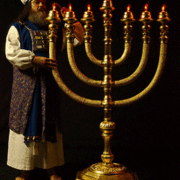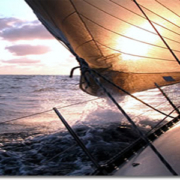The Living Water
In the book by Alfred Edersheim, The Life and Times of Jesus the Messiah, the author records the following details regarding the feast of Sukkot as it was celebrated during Jesus’ Earthly Ministry: The festivities of the Week of Tabernacles were drawing to a close. ‘It was the last day, that great day of the feast.’ It obtained this name, although it was not one of ‘holy convocation,’ partly because it closed the feast, and partly from the circumstances which procured it in Rabbinical writings the designations of ‘Day of the Great Hosannah,’ on account of the sevenfold circuit of the altar with ‘Hosannah’; and ‘Day of Willows,’ and ‘Day of Beating the Branches,’ because all the leaves were shaken off the willow boughs, and the palm branches beaten in pieces by the side of the altar. It was on that day, after the priest had returned from Siloam with his golden pitcher, and for the last time poured its contents to the base of the altar; after the ‘Hallel’ had been sung to the sound of the flute, the people responding and worshipping as the priests three times drew the threefold blasts from their silver trumpets—just when the interest of the people had been raised to its highest pitch, that, from amidst the mass of worshippers, who were waving towards the altar quite a forest of leafy branches as the last words of Psalm 118 were chanted—a voice was raised which resounded through the temple, startled the multitude….It was Jesus, who ‘stood and cried, ‘Let anyone who is thirsty come to me and drink. Whoever believes in me, as Scripture has said, rivers of living water will flow from within them.’ (Jn. 7:37)
Yesterday we observed that John 8 contained a reference to Sukkot when Jesus announced He was the Light of the World. What has caught the attention of many scholars and Bible enthusiasts has been John 8:6-8 But Jesus stooped down and wrote on the ground with His finger.7 However, when they persisted with their question, He raised Himself up and said, Let him who is without sin among you be the first to throw a stone at her.8 Then He bent down and went on writing on the ground with His finger. AMPC
What many fail to notice is how this event is connected to John 7:37-39 Now on the final and most important day of the Feast, Jesus stood, and He cried in a loud voice, If any man is thirsty, let him come to Me and drink! 38 He who believes in Me [who cleaves to and trusts in and relies on Me] as the Scripture has said, From his innermost being shall flow [continuously] springs and rivers of living water.39 But He was speaking here of the Spirit, Whom those who believed (trusted, had faith) in Him were afterward to receive. For the [Holy] Spirit had not yet been given, because Jesus was not yet glorified (raised to honor). AMPC
How are these two connected? Jeremiah 17:1,13 The sin of Judah is written with a pen or stylus of iron and with the point of a diamond; it is engraved on the tablets of their hearts and on the horns of their altars,…O Lord, the Hope of Israel, all who forsake You shall be put to shame. They who depart from You and me [Your prophet] shall [disappear like] writing upon the ground, because they have forsaken the Lord, the Fountain of living waters. AMPC
Most likely Jesus was referencing this verse as He wrote in the dust. The prophet Jeremiah notes further: Jeremiah 2:13 For My people have committed two evils: they have forsaken Me, the Fountain of living waters, and they have hewn for themselves cisterns, broken cisterns which cannot hold water. AMPC
Sukkot is a reminder to forsake our empty cisterns that cannot hold the Living Water of Jesus and the Spirit. But are we thirsty for more of Him? Are we thirsty for more of the Spirit? C.S. Lewis wrote: “We are half-hearted creatures, fooling about with drink and sex and ambition when infinite joy is offered us, like an ignorant child who wants to go on making mud pies in a slum because he cannot imagine what is meant by the offer of a holiday at the sea. We are far too easily pleased.” Empty cisterns are created from half-hearted children making mud pies in the slum. We fail to realize He has offered us a holiday by the sea. We are far too easily pleased. Leonard Ravenhill exhorts us: If the Holy Spirit is power, we need to learn how to operate the throttle. And if the Holy Spirit is a Person (and He is), then we really need to learn how to let Him operate us.

